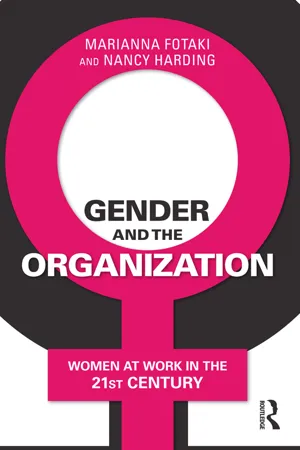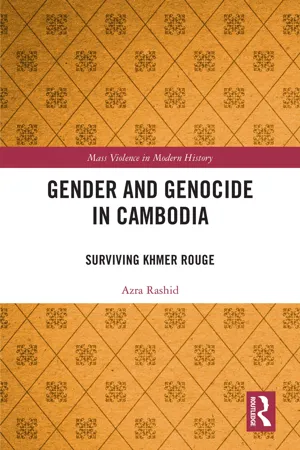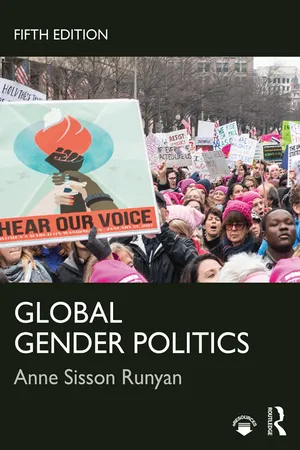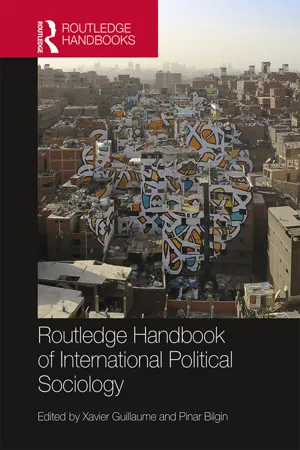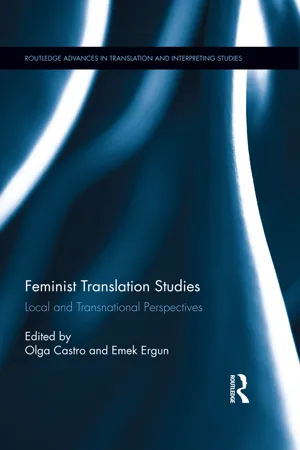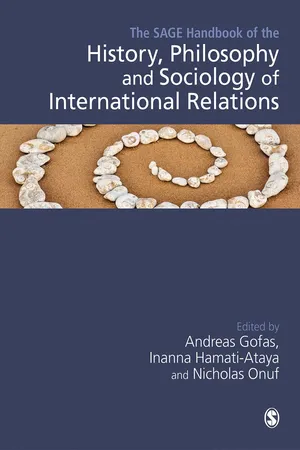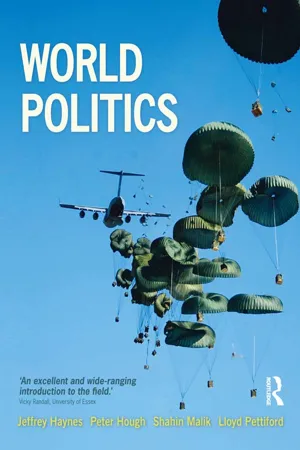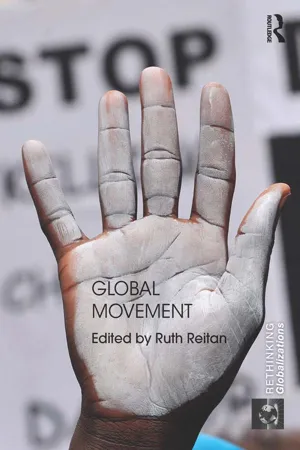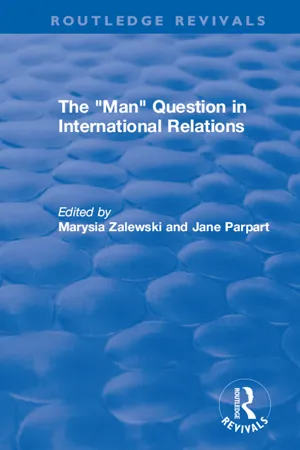Politics & International Relations
Transfeminism
Transfeminism is a social and political movement that seeks to address the intersection of transgender and feminist issues. It aims to challenge and dismantle traditional gender norms and advocate for the rights and inclusion of transgender individuals within feminist discourse and activism. Transfeminism emphasizes the importance of recognizing and supporting the diverse experiences and perspectives of transgender people within broader feminist movements.
Written by Perlego with AI-assistance
Related key terms
Related key terms
1 of 4
Related key terms
1 of 3
12 Key excerpts on "Transfeminism"
- eBook - ePub
Gender and the Organization
Women at Work in the 21st Century
- Marianna Fotaki, Nancy Harding(Authors)
- 2017(Publication Date)
- Routledge(Publisher)
Those whose work is judged as low status, low-skill and deserving of only small rewards are often global migrant labourers, so another key theoretical resource we deploy in this chapter, alongside intersectional theory, is transnational feminism. This body of work facilitates our examination of organizations as embedded in global networks of power against which the individual worker is powerless, making a case for collective organizing towards transformation of these exploitative relations. Power is historically conditioned but is also reshaped by transnational movements through which: ‘national spaces/identities of political allegiance [and] economic regulations are being undone and imagined communities of modernity are being reshaped at the macro-political (global) and micro-political (cultural) levels of everyday existence’ (Wilson and Dissanayake, 1996:6 quoted in Suner, 2007:54). Our third aim therefore is to bring transnational feminism to organization studies to better understand what is to be a mobile and precarious worker in transglobal late capitalism.Overall, this chapter explores theoretical and practical implications of politically radical articulations within feminism for re-thinking organizations, organizing and work through including an expanded understanding of intersectionality and transnationalism. Combining intersectionality with transnational feminism can bring new perspectives to organizational research. Transnationalism questions and de-centres the preoccupations of management and organization studies with those ‘Western’ concerns, boundaries of knowledge and epistemologies that inform global politics and economics (see also Metcalfe and Woodhams, 2012). With its focus on sociopolitical and economic contexts in which organizations operate and where new organizational forms emerge, transnationalism moves away from a view of organizations as insular and disconnected from global networks of power and culture. This is particularly important since as Braidotti (2006a:134) incisively puts it: ‘Advanced capitalism is a difference engine – a multiplier of de-territorialized differences, which are packaged and marketed under the labels of “new, hybrid and multiple or multicultural identities”’ (quotation marks in the original). - eBook - ePub
Spatializing International Politics
Analysing Activism on the Internet
- Jayne Rodgers(Author)
- 2004(Publication Date)
- Routledge(Publisher)
Feminists focus not only upon women as a category, but also upon gendered constructions of IR theory and practice. This challenges IR on many levels, by endowing women not only with international political agency, despite their often non-traditional roles, but also by acknowledging a wide range of other actors and practices too. The growth in feminist scholarship in this area has coincided with the spread of transnational activism – not just of women's movements but also of non-state politics more generally – and the relationality espoused in this work has much to offer the interpretation of non-elite political practices. Despite these moves to create alternative interpretations of international politics, the ontologies of IR reflect and sustain an artificial impression of political practices. Youngs has argued that only rudimentary attention has been paid to questions of spatiality in IR and that there is a ‘danger of a gender-neutral sense of spatiality persisting even in new critical work in this area’ (1996b: 2, emphasis in original), a challenge that could still be levelled today. Given the danger of a pervasive assumption of gender-neutrality, it is necessary to analyse gender and space in IR as intrinsically linked, rather than to create or sustain a synthetic division between them. Feminist work generally starts with women or gender but its applications are evidently much wider than this. Analysis of the social construction of gender relations compels us to think about the ways in which all social relations are constructed (see Whitworth 1994/1997: 56). In linking the social with the political, feminist approaches can offer a greater insight into the nature of contemporary international affairs, where many of the key players, such as NGOs and MNCs, are evidently socio-political, rather than exclusively political actors, in the traditional IR sense - eBook - ePub
Gender and Genocide in Cambodia
Surviving Khmer Rouge
- Azra Rashid(Author)
- 2023(Publication Date)
- Routledge(Publisher)
Feminist politics of translation allow us to challenge the institutions, practices, and social norms that have in the past reproduced the power hierarchies in cross-cultural feminist research undertakings. This chapter focuses on transnational feminist research praxis that seeks to resist the dominant discourses of history and the politics of translation across different cultures. It engages with some of the historical and contemporary feminist perspectives and analyses that have shaped the work of transnational feminism. It highlights the material conditions of transnational feminist work that necessitate certain strategies and practices, including translation, collaboration, and creative methods to produce knowledge across different cultures and languages. Foregrounding the politics of translation as a way of knowing in transnational feminist research, I explore some of the mechanisms and strategies, including translation, code-switching, and interpretation that are employed by researchers and their research participants and collaborators working in a transnational context. Finally, this chapter offers a discussion of the creative methods that can be used to address the limits and possibilities of transnational feminist research. Research-creation allows a nuanced understanding of the practices and processes of feminist knowledge production across different cultures. In this chapter, I discuss the utility of research-creation as a method, which has resulted in this text and the accompanying short film, 1 in knowing and engaging with the experiences of women in Cambodia in an ethical manner. Transnational feminism Transnational is a border event where national boundaries are crossed. In Borderlands/La Frontera: The New Mestiza (1987), Gloria Anzaldúa articulates the politics of borders and borderlands, focusing on issues of Mexican immigration, race, gender, and culture in the United States - eBook - ePub
- Anne Sisson Runyan(Author)
- 2018(Publication Date)
- Routledge(Publisher)
Still, the development of greater solidarity among feminists in the GJM has not been without tension. As Johanna Brenner notes, just as some men in Marxist and labor movements attempted to marginalize feminist perspectives and issues such as reproductive rights in critiques of globalization generated at World Social Forums, women in some community-based movements—particularly those that are faith-based or receive funding from the Catholic church—have been silent on reproductive rights and the rights of sexual minorities even as they have advanced other feminist arguments at these forums, such as calling for attention to domestic violence as bound up in globalization (Brenner 2009: 34–36). But beyond frictions with respect to issue areas, there are more fundamental concerns raised about power differentials among feminists working for global justice.As indicated by the above example of silences on reproductive and LGBT rights, and exemplified in the problematics of the FMF campaign against gender apartheid in Afghanistan discussed in Chapter 4 , there are major ongoing debates in feminist thought and movements, particularly those that are transnational in character, about how to resist either regressive or imperial tendencies in order to build more equal and just solidarities to better confront crises of representation, insecurity, and sustainability. At core, intersectional feminisms seek to enhance a “politics of recognition” in which the diverse voices and perspectives of subjugated women and men, or, more accurately, multiple sexes and genders, are represented equitably, and they seek to amplify a “politics of redistribution,” which challenges the classist, sexist, racist, and heterosexist ways in which the material world is divided up (Fraser 1997). A politics of recognition is most central to ameliorating the crisis of representation but also key to challenging the crisis of insecurity, and a politics of redistribution is most central to countering the crisis of sustainability but also key to reducing the crisis of insecurity and enhancing a politics of recognition.At various times, however, there have been tensions between a politics of recognition and a politics of redistribution because one has backgrounded the other. For example, early Marxist feminism was critiqued for focusing on only gendered class relations and material redistributions to solve these inequities without recognition of the need for a greater democratization of struggles to identify and resist not only gendered class exploitation, but also other oppressions based on race, sexuality, and nation that intertwined with, variegated, and intensified class stratification. Later, various forms of cultural and ethnic feminisms were critiqued for a relative inattention to class analysis and a politics of material redistribution as they tended to pursue a kind of politics of recognition known as identity politics. Identity politics, while useful to foreground (and thus represent) the experiences and perspectives of a particular subjugated identity group (such as women, Asian women, Latinas, Chicanas, lesbians, and so on), also tended, on the one hand, to essentialize and homogenize such identity groups and, on the other hand, to so fragment identity into smaller and smaller groupings (young-disabled-lesbian-Chicanas) that no common cause could be seen among these groupings of infinite variety. The fragmentation of identity, however, served to draw attention to “hybrid” or “diasporic” identities that resist the forces of essentialism and homogenization and cut across identity groups (Anzaldúa 1999), and thus enable the development of coalition politics. Identity fragmentation (to the point of deconstructing all identities to expose them as always provisional and subject to change) also constitutes a poststructural feminist strategy (as well as a “queering” strategy) to denaturalize and thus destabilize identities, making them unavailable to be mobilized for the purposes of power and control or to be targets of power and control. Although, for a time, the developments of a politics of recognition overshadowed thinking about a politics of redistribution, today many contemporary feminist theorists and activists are emphasizing both to counter the rise of neoliberal globalization and governmentality and their security apparatuses. Developing and exercising both these politics entail anti-imperialist, anti-racist, anti-global capitalist, anti-heteronormative, anti-homonormative, and anti-transphobic inquiry and political commitments. - eBook - ePub
- Chris Corrin(Author)
- 2014(Publication Date)
- Routledge(Publisher)
In an intersectional and transnational framework considerations of the transformative political projects being undertaken by women in Asia, Africa, Europe and North America point to the ways in which feminist praxis in a global context can emerge within the twenty-first century. This would involve: ‘shifting the unit of analysis from local, regional, and national culture to relations and processes across cultures … [and] a corresponding shift in the conception of political organising and mobilization across borders … The ideologies of “immigrants”, “refugees”, “guestworkers” and “citizens” would need to be reconceived with new definitions of justice’ (ibid). This is not an easy project! However, work is ongoing with feminist reconsiderations of many key political conceptions such as citizenship. Feminist theorists have developed insights into citizenship which highlight that the consistent exclusion of gendered realities is both historically contingent (Pateman 1988, 1989) and/or constitutive in the theory and practice of citizenship, with women having ‘roles’ as ‘women’ in practice and ‘honorary men’ in public life (Yuval-Davis et al 1992; Heinen 1995). Nira Yuval-Davis (1997) argues that as the boundaries of ethnic and national groups often do not overlap those of the state, and exist within and across states, both collective identities and citizenships need consideration. Many feminist struggles contribute to deconstructing binary divisions and ‘engendering citizenship’ by actively recognising the ‘differentiated universalism’ which Ruth Lister (1997) proposes as acknowledging differences and women’s differentiated positioning. These feminist reworkings of considerations around citizenship aim for an inclusive synthesis which allows for women’s agency while challenging structural constraints. The distinction drawn between being a citizen and acting as a citizen is important in the context of feminist analyses and resistance to male violence - Xavier Guillaume, Pınar Bilgin, Xavier Guillaume, Pınar Bilgin(Authors)
- 2016(Publication Date)
- Routledge(Publisher)
The ways in which this simple, yet disruptive, insight manifests in contemporary feminist scholarship relates, for example, security measures implemented in airports in the name of ‘international security’ to the stability of a binary gender order (Shepherd and Sjoberg 2012; Redden and Terry 2013). Contemporary feminist research draws connections between social and context-specific idea(l)s about motherhood and assumptions about agency and political violence (Gentry 2009; Åhäll 2012); it establishes links between popular cultural representations of gender politics and foreign policy (Larson 2013; Zalewski 2013). The imbrication of everyday gender performances in practices of global politics renders visible the interconnections between the ‘international’, its politics and the kinds of sociological enquiry that permit nuanced and holistic understandings of its organization. Because “gender makes the world round” (Enloe 2000 [1989]: 1), these enquiries need at least to pay attention to gender as a category of analysis if they are not to overlook a significant dynamic that shapes and is in turn shaped by the way we live in the world.Relationality/emotionality
In her recasting of International Relations, Christine Sylvester argues instead for a focus on ‘relations international’. Such an approach, attentive to the relational aspects of international politics, “puts the emphasis directly on varieties of connection … across the lines, fences, wires, walls, imaginations, sound bites, politics, and immigration and customs guardhouses of the world” (Sylvester 1994: 219). This creative endeavour, which recognizes many more forms of power, authority, legitimacy and political activity than does a conventional narrow view of international relations as political practice, permits an understanding of ourselves as connected and connective entities and of politics as the site at which our mutual being in the world is negotiated.Encountering the international as a relational space and prioritizing the relational aspects of politics demands that we think differently about how to generate knowledge/understanding of that space and how to both apprehend and communicate that knowledge. Orienting ourselves as scholars in this way challenges the dominance of rationalism that has thus far characterized the study of global politics, as a ‘proper’ social science (Smith 2000: 383). This move had been labelled by some as an “aesthetic turn” (Bleiker 2001; see also the 2010 special issue of Global Society titled “Aesthetics and Global Politics”; Sylvester 2011a, 2011b), and by others as a move to embrace the emotionality of politics and its inherently social quality, which is a radical departure from the conventional guiding principles of the discipline of IR. It is only through exploring the relations, connections and emotions that constitute various, and variously well-researched, international social and political landscapes that we can hope to change disciplinary narratives (Marshall 2011: 690) and begin to tell different stories about our world. As Anna Agathangelou and L.H.M. Ling argue, storytelling creates “a space to critique and reconstruct our worlds by voicing, seeing understanding, and bridging the differential locations and subjectivities of selves and others [and] … helps us politicize social relations critically- eBook - ePub
Feminist Translation Studies
Local and Transnational Perspectives
- Olga Castro, Emek Ergun, Olga Castro, Emek Ergun, Olga Castro, Emek Ergun(Authors)
- 2017(Publication Date)
- Routledge(Publisher)
Depoliticisation consequent to mistranslation may happen because any concept carries within itself a genealogy and a silent history that, when transposed to other topographies, may produce unanticipated readings (Miller 1986). Hence, one of the recurring challenges for feminist transnational alliances lies in the attempt to translate concepts that resist appropriation. In the politics of translation, the concern must not only be with the travels and appropriations of terms/discourses, but with the extent to which one wants to open the translated sign and to whom it should be open.Many feminists, in trying to find productive ways of establishing dialogues across diverse and disperse feminist communities in the articulation of transnational alliances, have resorted to the practice of translation as a privileged site for the negotiation of difference in a world of increasing transborder movements and cross-cultural contacts. However, to build alliances that are respectful of difference, in developing more South-to-South oriented dialogues, it is often necessary to rely on processes of continuous (and faithless) translation. Feminists in the North and South can disturb hegemonic narratives of the other, of gender and of feminism itself through practices of translation that make visible the asymmetrical geometries of power along the local-regional-national-global nexus. It is through translation as constant mediation between worlds that feminists are able to develop critical multi-axis cartographies of knowledge.Davis : I like the term “transnational feminism” because it does not presuppose a unified “we women” which seemed to underlie earlier notions like “global feminism”. I see transnational feminism as a feminism that takes differences among women as its starting point. This means being attuned to the differences in power which shape our interactions and finding ways to speak to one another across these differences in the interests of generating mutually beneficial political activities. Many of the lessons that translators learn could be helpful for feminist activists engaged in transnational alliances. For example, every translator knows that there are words that simply defy translation—words that do not have the same meanings in different cultural contexts. Translators find different strategies of dealing with this unavoidable problem. Sometimes the word is left in the original language indicating that there is - Andreas Gofas, Inanna Hamati-Ataya, Nicholas Onuf, Andreas Gofas, Inanna Hamati-Ataya, Nicholas Onuf(Authors)
- 2018(Publication Date)
- SAGE Publications Ltd(Publisher)
As we have demonstrated in this chapter, the history of Feminist IR has been bold and aspiring, although it has been so often overlooked by mainstream accounts of global politics, war and peace, and the political economy. Despite this neglect, feminist scholars have pioneered new ways of studying and knowing different phenomena in the international political, economic, environmental and social realms. That knowledge is grounded in the history of feminist movements and activism that has created the institutional space for questioning personal and international issues not conventionally seen as ‘political’. Locating diverse women's standpoints as critical sites of study has brought localised individual and collective experiences into the study of IR. In this way feminism has transformed our understanding of IR knowledge: where it comes from, what makes it possible, how it is produced and by whom. As different philosophical strands and approaches of Feminist IR have been pioneered, new connections can be drawn between the local and the global to ensure that the multifaceted nature of international relations is at the forefront of future investigations.References
Ackerly , Brooke A.andTrue , Jacqui(2008 ) ‘An intersectional analysis of international relations: Recasting the discipline’ , Politics & Gender , 4 (1 ): 156 –173 .Ackerly , Brooke A.andTrue , Jacqui(2010a ) Doing Feminist Research in Political and Social Science . New York : Palgrave Macmillan .Ackerly , Brooke A.- eBook - ePub
World Politics
International Relations and Globalisation in the 21st Century
- Jeffrey Haynes, Peter Hough, Shahin Malik, Lloyd Pettiford(Authors)
- 2013(Publication Date)
- Routledge(Publisher)
Poststructuralism and International Relations: Bringing the Political Back In (Boulder CO:Lynne Rienner) An introduction (so the book tells us) to the works of Foucault, Derrida, Lacan and Zizek (among others) suggesting that ‘they provide the tools for the rearticulation of the question of the political’.- Walker,R.B.J. (1993) Inside/Outside: International Relations as Political Theory (Cambridge:Cambridge University Press) Attempts both to deconstruct IR and provide it with alternative visions.
Feminism specific recommended reading- Enloe,C. (1989) Bananas, Beaches and Bases: Making Feminist Sense of International Relations (London:Pandora) Highlights the complexities of gender relations as they are affected by other identity intersections such as ethnicity, geographical location and class.
- Marchand,M. and Runyan,A.S. (2000) Gender and Global Restructuring: Sitings, Sites and Resistances (London:Routledge) An edited collection of leading feminist writers answering questions concerning how a gender lens can improve conventional accounts of globalisation, gender and global restructuring, gendered ideologies and relations changing in different national/regional contexts and more.
- Steans,J. (1998) Genderand International Relations (Oxford:Polity Press) Very popular in the USA where students are keenly aware of the link between books and credit points. Covers with clarity such topics as feminist theories; international relations theory; gender in the theory and practice of ‘state-making’; feminist perspectives on war and peace; feminist approaches to security; the gender dimension of international political economy; gender and the politics of development; and women's human rights.
- Dryzek,J. (1997) The Politics of the Earth: Environmental Discourses (Oxford:Oxford University Press) Looks at environmental discourses as a way into describing what is happening to the planet. Accessible and illuminating.
- Laferriere,E. and Stoett,P. (1999) International Relations Theory and Ecological Thought
- Jonathan Evans, Fruela Fernandez, Jonathan Evans, Fruela Fernandez(Authors)
- 2018(Publication Date)
- Routledge(Publisher)
These questions, by inviting intersectional approaches to translation, challenge and complicate earlier approaches to feminist translation that almost exclusively focused on gender, framed habitually in Western-centric, binary and essentialist terms. In other words, a renewed intersectional focus has helped feminist translation studies somewhat grow away from an exclusionary, essentialist focus on gender (defined in relation to an abstract notion of a supposedly universal, singular patriarchy) and become more attuned to geohistorically contingent, multiple, interlocking systems of domination and corresponding, coalitional agendas of resistance pursued in feminist translation praxes. Interestingly, as feminist translation studies adopted a more intersectional approach to the study of translation, which is a trans-spatial practice by definition, it has also become more attentive to the political implications of that spatiality, or to ‘the politics of location’ (Rich 1986, Kaplan 1994, Mohanty 2003) – a term coined by US-American feminist poet and scholar Adrianne Rich and adopted as a key conceptual tool by several transnational feminist scholars. The concept is often recapped in Rich’s self-reflexive statement, ‘a place on a map is also a place in history within which, as a woman, a Jew, a lesbian, a feminist, I am created and trying to create’ (1986: 212). By embracing the critical lens of intersectionality as well as the politics of location, feminist translation studies can now recognise more easily that every act of feminist translation also has a place in a map and in history within which the languages being used, the texts being translated, the discourses being de/activated and the agents re/signifying the travelling text (author, translator, reader, publisher, etc.) ‘are created and trying to create (ibid.).’Another theory that has helped spatialise the study of translation in general and feminist translation in particular is Edward Said’s ‘travelling theory’, or more accurately the theory of travelling theory, first formulated in his 1983 The World, the Text, and the Critic- eBook - ePub
- Ruth Reitan(Author)
- 2013(Publication Date)
- Routledge(Publisher)
In a parallel fashion, movements of racialized women, particularly in the Americas, were challenging the hegemonic feminism of middle-class white-dominated women's movements and forging antiracist feminist politics premised on a multiplicity of oppressions and the intersections of race, class, and gender, among other axes of social differentiation and inequality. Through the 1980s, ‘US Third World feminism’ was the site of ground-breaking political and theoretical work on coalition-building across difference, on epistemologies for coalition politics and the new subjectivities produced in and through these politics (Haraway, 1991; Harding, 1992; Hill Collins, 2000; Sandoval, 2000; Yuval-Davis, 1997). From these twin processes, ‘transnational feminism’ emerged as a distinct theoretical and political perspective in feminist studies, beyond its being a simple descriptor for the praxis of transnational feminist networks (Desai, 2008, p. 39; Mohanty, 2003, p. 124; see also Grewal and Kaplan, 1994).In this perspective, concrete struggles for survival rather than putatively common oppression or shared identity is seen as the more reliable basis for solidarity, and ‘coalition’ rather than ‘unity’ is the preferred political goal (Mohanty, 2003, p. 117, citing Reagon, 1983). For marginalized communities struggling for survival, a tactical ‘politics of identity’, grounded in a common historical experience of oppression and struggle, remains central to consolidating those movements. Crucially, it is also a precondition for coalition politics with others around broader agendas. Both are interdependent and complementary forms of activism (Hill Collins, 2000, p. 67; see also Eschle and Maiguashca, 2010, pp. 159ff). Coalitions as a political and organizational form are premised simultaneously on recognition of social diversity, political pluralism, and organizational autonomy, coupled with the possibility of concrete collaboration across difference.The above suggests that coalition-building in the face of difference and inequality requires transversal politics - eBook - ePub
- Marysia Zalewski, Jane Parpart(Authors)
- 2019(Publication Date)
- Routledge(Publisher)
One way that we, the editors of this volume and academics interested in gender, sought to tackle these evocations and representations was to join in the efforts to engender the field of international relations. Inspired by feminist analysis, we initially tried to highlight the absence of women in the field as well as the power and dominance of men. However, we began to question those traditional feminist methods; the result of that questioning has led to this volume, which represents an attempt to problematize the subjectivities of men, the subject of man, and the effects of masculinities in international relations. It also led to a series of questions about the effects and implications of apparently opposing feminist strategies to engender the field. This introduction explores what all of this means and how we got from the “woman” question to the “man” question.The Personal Is Political–Or Is It?Uncomfortable questions surround the phenomenon of men “doing feminism” in international relations. The idea for this book was partly sparked at the 1992 International Studies Association (ISA) conference in a panel on feminism. The questions following the panel revolved around the politics of men doing feminism and the relationship of men and masculinity to the theory and practice of international relations. One male panelist puzzled over the abilities and motivations of male scholars participating on such a panel; a male audience member commented that although he was committed to feminist politics in his personal life, he could not see the connection with his work as an international relations scholar. Is the personal so unconnected to the professional? Why are men asking these questions of themselves? What are the implications for our understanding of the gendered character of international relations?We asked several men and women to write papers for a panel tentatively titled “Masculinity, Feminism and Power in International Relations” to be presented at the 1993 ISA conference. As editors we were plagued with still more questions. Should we be suspicious of men’s desires to get involved in feminist analysis? What were their motivations? Conversely, could we persuade men to take feminist work seriously by involving them in it? Might this involvement lead them to realize that their
Index pages curate the most relevant extracts from our library of academic textbooks. They’ve been created using an in-house natural language model (NLM), each adding context and meaning to key research topics.
Explore more topic indexes
Explore more topic indexes
1 of 6
Explore more topic indexes
1 of 4
